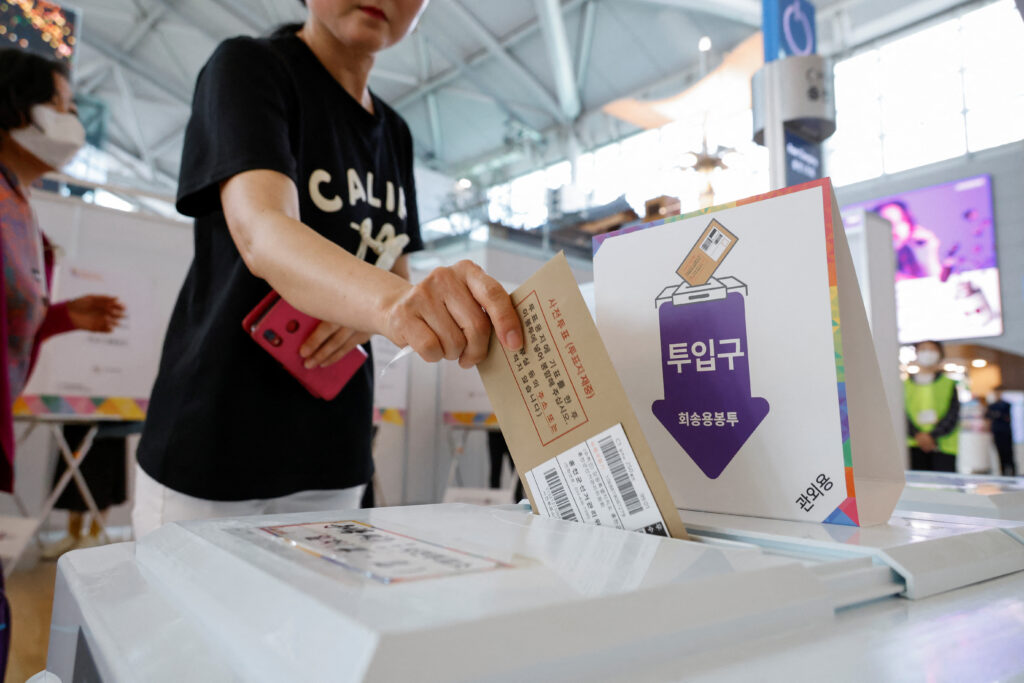South Korea’s national elections earlier this month resulted in a historic win for the Democratic Party and the rest of the opposition. The conservative People Power Party (PPP) did even worse in 2024 than they did in 2020, the first parliamentary elections after Park Geun-hye’s impeachment.
Much of the blame for the electoral disaster lies at the feet of President Yoon Suk Yeol. While he and his conservatives have avoided a Democratic veto-proof majority, there’s now almost no incentive for bipartisan cooperation. Yoon’s approval rating cratered to an historic low after the election and members of his family and close confidantes are under immense scrutiny over alleged illegal behaviour and improprieties.
The Democratic Party and its allies made investigating these individuals a major wedge issue during the campaign and will have the seats — 187 to the PPP’s 108 — necessary to initiate special investigations into Yoon administration officials and others, including First Lady Kim Keon-hee.
Kim is a lightning rod for public opinion in South Korea and has become a poster child for the corruption, graft and nepotism voters suspect elites in the country use to their advantage. Han Dong-hoon, the former leader of the PPP, and Lee Jong-sup, the very brief ambassador to Australia, are also in line for special investigations launched by the National Assembly.
President Yoon has been a largely ineffective president at home. An outsider who never held an elected office before becoming president, Yoon made enemies on both sides of the aisle from the very beginning of his administration and does not have the connections, relationships and leverage that typically comes with a lifelong career in politics. The administration has been able to pass less than one-third of all legislation it sent to parliament, far below the 61 per cent mark of past presidencies.
As Hannah June Kim observes in her review of the post-election scene, ‘[t]he electoral landscape was difficult and unfavourable for the ruling party from the beginning’. But the results are poor enough that South Korea’s conservatives now face a major reckoning. Yoon himself is quickly becoming a lame duck, unable to address major domestic issues that voters care most about.
But as Karl Friedhoff points out in the first of our two lead articles this week, South Korea’s foreign policy will likely remain unchanged. In Yoon’s first two years he has reset relations with Japan through a series of meetings, summits and institutional arrangements, doubled down on the alliance with the United States by welcoming strategic assets to the peninsula and ‘friend-shoring’ semiconductors and car manufacturing, and has expressed no interest in engaging North Korea.
These foreign policy decisions ‘took place under almost identical conditions with opposition parties controlling 181 seats’, Friedhoff explains. ‘His engagement with Japan was never popular with the public outside of his base’ and ‘Yoon has shown a willingness to ignore public opinion and soak up criticism from the opposition.’
As domestic political turmoil increases, ‘the president will be encouraged to intensify his efforts abroad now that it is clear there’s no chance to advance a domestic reform agenda.’
Being impervious to public opinion and embracing executive authority in foreign policy probably helps explain why Yoon dispatched Trade Minister Ahn Duk-geun to Japan less than two weeks after the election to ink an investment deal with Toray Industries. The Japanese chip company plans to expand manufacturing in South Korea over the next two years, demonstrating confidence that the government in Seoul will continue friendly relations with Tokyo.
Trips abroad like this one ‘will be rapidly rescheduled and perhaps even expanded as the president resumes his role as the country’s number one cheerleader’, Friedhoff says. The upshot is that pressing issues in South Korea — the demographic crisis, consumer prices, inequality — will continue to fester without attention from the president.
Seoul hosted the third Summit for Democracy in March, will host a South Korea-Japan-China summit in late May and the first-ever Korea-Africa summit the month after, as the administration continues to gaze abroad. Yoon will also likely reschedule visits to Europe he postponed due to the election, and may seek a greater role for Seoul with NATO or the Ukraine war. Nothing suggests a departure from the pro-West, pro-alliance foreign policy and security posture Yoon has championed since 2022.
As the election results demonstrate, these moves resonate little with voters. And as Daniel Sneider highlights in our second lead this week, Yoon remains well out in front of public opinion in his pursuit of more pragmatic relations with Japan, and has been criticised for sacrificing South Korea’s commercial interests to the extent that he ‘draws South Korea into a de facto China containment strategy’ by participating in the Biden administration’s ‘friend-shoring’ push. Alongside this, North Korea policy is ‘certain to be an ongoing point of contention between the opposition and the Yoon administration’.
Amid these structural hazards to the political sustainability of his foreign policy agenda, Yoon may increasingly lack legitimacy in the eyes of the South Korean public as the opposition investigates the administration and stonewalls legislation. This may ultimately undermine the stickiness of Seoul’s efforts to reset ties with Tokyo and fortify the US alliance to withstand another Trump presidency. In these circumstances, Korean nationalism on the left, the sort that is ambivalent about US leadership and wary of cleaving too strongly to one larger power over another, could reassert itself.
Yoon must learn how to build bridges both within his own party and across the aisle. If he chooses to muddle through, South Korea’s domestic issues will worsen, his party will abandon him, and he may face calls to resign.
The EAF Editorial Board is located in the Crawford School of Public Policy, College of Asia and the Pacific, The Australian National University.

